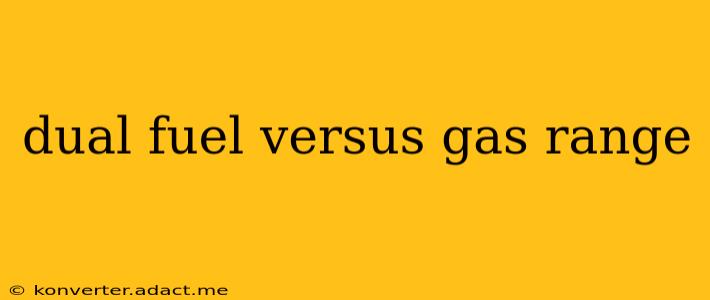Choosing between a dual fuel range and a gas range can feel overwhelming. Both offer distinct advantages, making the decision depend heavily on your cooking style and preferences. This comprehensive guide will dissect the key differences, helping you make an informed choice for your kitchen.
What is a Dual Fuel Range?
A dual fuel range cleverly combines the best of both worlds: a gas cooktop and an electric oven. The gas burners provide precise, instant heat control often favored by experienced cooks, while the electric oven offers even heat distribution for consistent baking and roasting results. This combination caters to a wide range of cooking needs.
What is a Gas Range?
A gas range, as the name suggests, utilizes gas for both the cooktop and the oven. It's a classic choice known for its responsiveness and visual appeal of the open flames. Gas ranges often boast quicker heating times on the cooktop compared to electric, and many find the visual cues of the flames helpful in monitoring heat.
Dual Fuel vs. Gas Range: Key Differences
| Feature | Dual Fuel Range | Gas Range |
|---|---|---|
| Cooktop | Gas burners | Gas burners |
| Oven | Electric | Gas |
| Heat Control | Precise gas cooktop, even electric oven heat | Responsive gas cooktop, potentially uneven gas oven heat |
| Cleaning | Easier oven cleaning (usually self-cleaning) | Can be more challenging to clean |
| Energy Efficiency | Can be more energy-efficient overall | Generally less energy-efficient than electric ovens |
| Cost | Typically more expensive | Generally less expensive |
| Maintenance | May require separate maintenance for gas and electric components | Typically requires less maintenance |
What are the Pros and Cons of a Dual Fuel Range?
Pros:
- Precise Gas Cooktop: Offers superior control over heat for delicate cooking tasks.
- Even Electric Oven: Ensures consistent baking and roasting results.
- Self-Cleaning Feature: Many models offer self-cleaning ovens for easy maintenance.
- Versatile Cooking: Caters to both stovetop and oven cooking preferences.
Cons:
- Higher Cost: Typically more expensive than gas or electric ranges.
- Dual Maintenance: Requires maintenance for both gas and electric components.
- Installation: May require a gas line connection and electrical outlet.
What are the Pros and Cons of a Gas Range?
Pros:
- Lower Cost: Generally more affordable than dual fuel ranges.
- Responsive Heat: Gas cooktops heat up quickly and offer immediate heat adjustments.
- Visual Cues: The visible flames provide visual feedback for heat control.
- Simpler Maintenance: Typically requires less maintenance than dual fuel ranges.
Cons:
- Uneven Oven Heat: Gas ovens can sometimes have uneven heat distribution, leading to inconsistent baking results.
- Cleaning Challenges: Cleaning gas ovens can be more challenging than self-cleaning electric ovens.
- Safety Concerns: Requires proper ventilation to avoid gas buildup.
Which is Better for Baking?
For consistent baking results, a dual fuel range with its electric oven is generally preferred. The even heat distribution of an electric oven minimizes hot spots and ensures uniform baking. While some high-end gas ovens offer excellent baking performance, achieving consistent results across different baked goods is often easier with an electric oven.
Which is Better for Boiling and Frying?
For boiling and frying, both dual fuel and gas ranges excel. The immediate responsiveness of gas burners provides precise control over heat, ideal for tasks requiring quick adjustments in temperature. This makes them superior for searing, sautéing, and deep frying.
Which Range is More Energy Efficient?
Generally, dual fuel ranges can be more energy-efficient overall, particularly due to the efficiency of electric ovens. However, the specific energy consumption depends on the model and usage patterns. Gas cooktops are generally quick and efficient for their task, but gas ovens can consume more energy than electric ovens.
Which is Easier to Clean?
Dual fuel ranges often have the advantage in terms of ease of cleaning, especially those with self-cleaning ovens. Cleaning gas ovens requires more manual effort. However, regular cleaning practices are crucial for both types of ranges, regardless of the cleaning features.
Which Type of Range is Best for My Kitchen?
The best choice depends on your individual needs and priorities. Consider your cooking style, budget, and kitchen setup. If even baking and ease of cleaning are top priorities, a dual fuel range is a strong contender. If responsiveness and affordability are key, a gas range might be a better fit. Carefully weigh the pros and cons discussed above to determine which range best suits your culinary needs.
